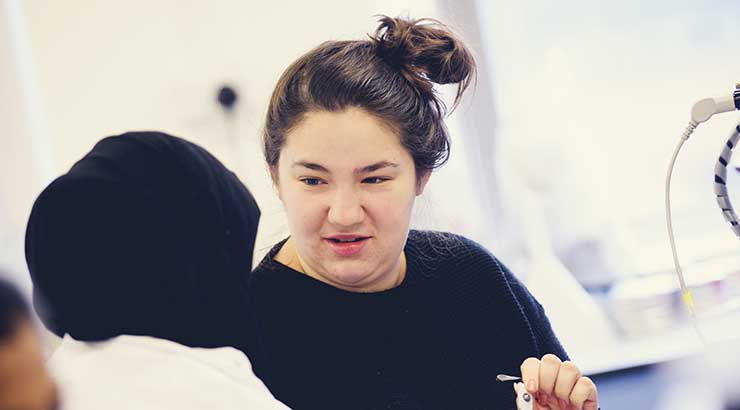Be meningitis, measles, mumps and rubella (MMR) aware
Students are known to be at higher risk.
What you need to do
-
Step 1
Meningitis
You should make sure you are aware of the signs and symptoms of meningitis, not just for you, but for friends and colleagues. Early recognition of meningitis can greatly improve the outcome of the disease.
Bacterial meningitis is still a rare disease, but it can progress rapidly and can, in some cases, be life threatening. Students coming to university for the first time are known to be at higher risk of meningitis than the general population, particularly during their first few weeks at university. Therefore, all students should be immunised, regardless of age or country of origin.
Viral meningitis is not usually as serious, although people can feel quite unwell, may need to go into hospital briefly and may take a long time to recuperate. It’s not usually passed from one person to another, but can be a complication of a wide variety of different viruses.
If you are concerned or have questions, please contact the Meningitis Research Foundation helpline on 080 8800 3344, or the Meningitis Now 24-hour helpline on 0808 80 10 388.
MMR
Measles, mumps and rubella (MMR) are diseases that can have serious complications.
-
Step 2
There is no vaccine for meningitis B, however, there is a vaccination for meningitis C and you should make sure you are protected by ensuring you have already been given the vaccination. All UK-born students should have received the vaccination as part of a childhood immunisation programme, but if you can’t remember or are unsure, you should call your doctor to check. Vaccination is free and can be given at any time.
-
Step 3
In order to be vaccinated you will need to register with a doctor
-
Step 4
MenACWY vaccination
A MenACWY vaccination offers protection against four different causes of meningitis and septicaemia - meningococcal (Men) A, C, W, and Y diseases.
It is available to all first-time university entrants up to 25 years of age, including international students. If you have not yet had this vaccination, we recommend you request the vaccination from your GP.
Book an appointment with a GPMMR vaccination – measles, mumps and rubella
It is important that you make sure you are protected from Measles, mumps and rubella (MMR) by checking your immunisation history and arranging MMR vaccinations, if necessary. Even a mild case of the disease may disrupt studies for a length of time. The two-dose vaccination is very effective in preventing the disease.
The Department of Health and Public Health England recommend that students have adequate immunity to mumps and measles. Please check with your parents and/or home doctor whether you have received two doses of the MMR vaccine. If not, please ask your doctor to complete your immunisation.
To be protected effectively you should have had two doses of the vaccine. The MMR vaccine protects against all three diseases and vaccination is free.
Non-UK born students and international students
Non-UK born students and international students
International students may not be fully immunised against measles, mumps and rubella or be protected against meningitis C.
To get vaccinated and check immunisation history, please call your doctor to arrange to be given two doses of MMR vaccine and the MenACWY vaccine. Vaccinations are free.
You may also be interested in

Book an appointment
How to book appointments with your doctor, including information for the University Health Centre.

Getting treatment on the NHS
Information for students, including international and European Union/European Economic Area students, on getting treatment on the NHS.

Register with a doctor
How to register with a doctor, including information for the University Health Centre.

Urgent medical care
Information on where to get urgent medical care.
